- Last Updated: January 15th, 2026
Key Takeaways
Start your Meta-lawsuit by thoroughly researching relevant federal laws and gathering all evidence of harm, such as screenshots or medical records.
Find a lawyer with experience in tech company lawsuits who can navigate the complexities of legal battles against large corporations like Meta.
Collect robust documentation and evidence, including internal Meta communications, to strengthen your case against harmful platform policies or actions.
Overview of the Meta Lawsuit
On this page, we’ll discuss an overview of how to navigate the complexities of a Meta lawsuit, future implications of the Meta lawsuit, potential social media harm settlement amounts, and much more.
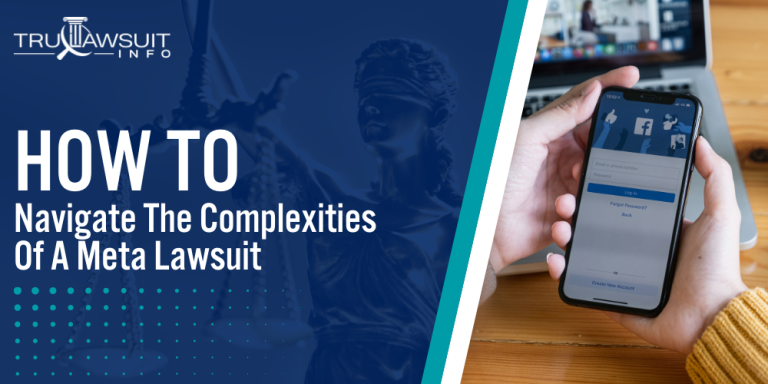
Intro to the Meta Lawsuit
Social media giant Meta faces allegations of creating features on its social media platforms that significantly contribute toward the youth mental health crisis.
The following points offer insights into the legal challenges Meta is currently addressing:
- Meta Platforms Inc. has been accused of knowingly deploying features harmful to children’s mental health.
- A substantial $725 million settlement has been reported concerning a lawsuit concerning data privacy issues.
- The Federal Trade Commission v. Meta Platforms, Inc. lawsuit focuses on anti-competitive behaviors and the accumulation of monopoly power through acquisitions.
- Lawsuit Against Meta was initiated by a coalition of 46 states for anti-competitive acquisitions such as Instagram and WhatsApp.
- In an unprecedented move, New Mexico’s lawsuit joins other international entities in raising concerns about digital privacy breaches.
- Attorney General Raúl Torrez plays a crucial role, leading a bipartisan coalition of attorneys general in federal court action against the tech giant.
If you or a loved one has experienced negative mental health effects due to excessive social media usage, you may qualify to file for compensation.
Contact TruLawsuit Info using the chat on this page to receive an instant case evaluation to discover if you are eligible to file in the Meta lawsuit.
Central Allegations and Claims in the Meta Lawsuit
The lawsuit against Meta raises serious allegations concerning child safety and the well-being of young users on its platforms.
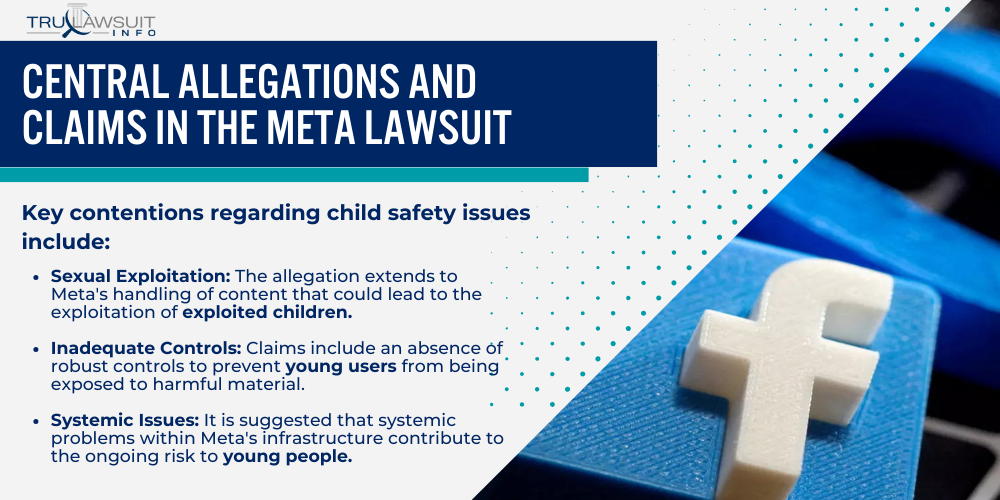
It asserts that Meta’s executives and systems failed to shield children from inappropriate content.
Contentions Surrounding Child Safety
The legal action highlights several grave concerns about the safety of young people on Meta’s platforms, emphasizing the company’s knowledge and inaction.
Child Sexual Abuse Material (CSAM): Plaintiffs argue Meta’s platforms have been accessed to spread CSAM, with executives purportedly aware yet insufficiently proactive in addressing the issue.
Key contentions regarding child safety issues include:
- Sexual Exploitation: The allegation extends to Meta’s handling of content that could lead to the exploitation of exploited children.
- Inadequate Controls: Claims include an absence of robust controls to prevent young users from being exposed to harmful material.
- Systemic Issues: It is suggested that systemic problems within Meta’s infrastructure contribute to the ongoing risk to young people.
Meta’s Alleged Role in Harm to Young Users
The lawsuit outlines several ways in which Meta is claimed to have played a part in harming its youngest demographic.
Key contentions regarding Meta’s role in harm to young users include:
- Erosion of Child Safety: Accusations detail how Meta’s platforms may have deteriorated the standard of safety expected to protect young users.
- Design Flaws: The design of the platforms is claimed to lack necessary safeguards for teen users, potentially facilitating harm.
- Addictive Features: Allegations also address features that are said to be addictive, disproportionately affecting the mental health of young users.
- Misrepresentation: There are claims that Meta falsely reassures the public about the safety and suitability of its platforms for children and teens.
Meta Lawsuit: Child Safety and Protection Measures
In light of recent legal actions, the focus on Meta’s protocols to ensure child safety has intensified, scrutinizing their effectiveness in protecting young users.
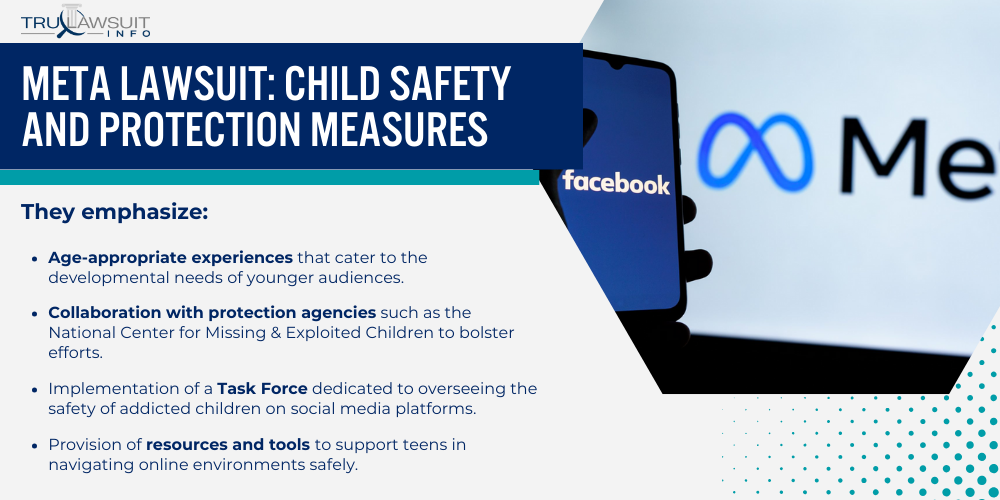
Expert Opinions and Recommendations
Professionals in the field of online safety strongly advocate for stringent measures to shield minors from digital harm.
They emphasize:
- Age-appropriate experiences that cater to the developmental needs of younger audiences.
- Collaboration with protection agencies such as the National Center for Missing & Exploited Children to bolster efforts.
- Implementation of a Task Force dedicated to overseeing the safety of addicted children on social media platforms.
- Provision of resources and tools to support teens in navigating online environments safely.
Meta’s Efforts to Safeguard Minors
Meta is taking steps to protect minors, including updating community standards and investing in AI technology to prevent harmful content.
Additionally, Meta consults with child safety experts to refine safety features and policies and implements stricter age verification processes to ensure age-appropriate access to content.
Meta has announced several initiatives to demonstrate its commitment to child safety:
- Updating community standards to reflect a zero-tolerance policy for inappropriate interactions with minors.
- Investing in AI sophisticated technology to detect and prevent potentially harmful content.
- Consulting with child safety experts to refine safety features and policies.
- Implementing stricter age verification processes to ensure age-appropriate access to content.
Legal Proceedings and Evidence in the Meta Lawsuit
The legal proceedings in the Meta lawsuit have been marked by scrutiny of internal documents and testimonies, alongside actions and statements by several state attorneys.
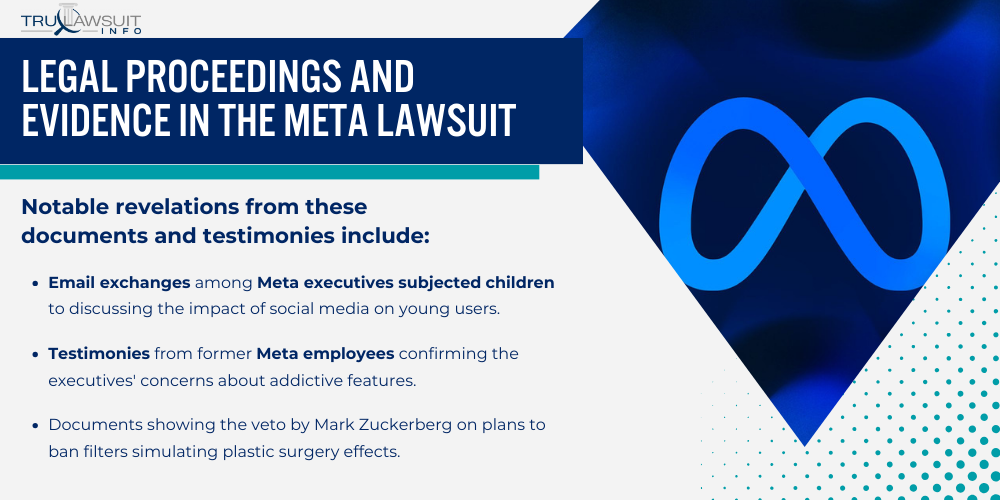
Internal Documents and Testimonies
Internal documents and executive testimonies play a pivotal role in the Meta lawsuit, with particular focus on their implications for data privacy and the alleged creation of addictive features for children.
Notable revelations from these documents and testimonies include:
- Email exchanges among Meta executives subjected children to discussing the impact of social media on young users.
- Testimonies from former Meta employees confirming the executives’ concerns about addictive features.
- Documents showing the veto by Mark Zuckerberg on plans to ban filters simulating plastic surgery effects.
- Allegations of selectively using cherry-picked documents and selective quotes to portray company practices.
State Attorneys’ Actions and Statements
The involvement of state attorneys has emphasized the broader governmental concern over Meta’s business practices and their alleged anticompetitive nature.
Key actions and statements from state attorneys include:
- Legal filings presenting consolidated actions from 46 states.
- Statements accuse Meta of abusing monopoly power through strategic mergers.
- Actions detail specific allegations such as Meta undermining competitors.
- Public statements reiterating the significance of the case for modern antitrust law.
Public and Professional Reactions to the Meta Lawsuit
Reactions to the Meta lawsuit have illuminated a spectrum of opinions across various sectors in society, shedding light on the profound concerns and defense arguments surrounding the social media giant’s impact on youth mental health.
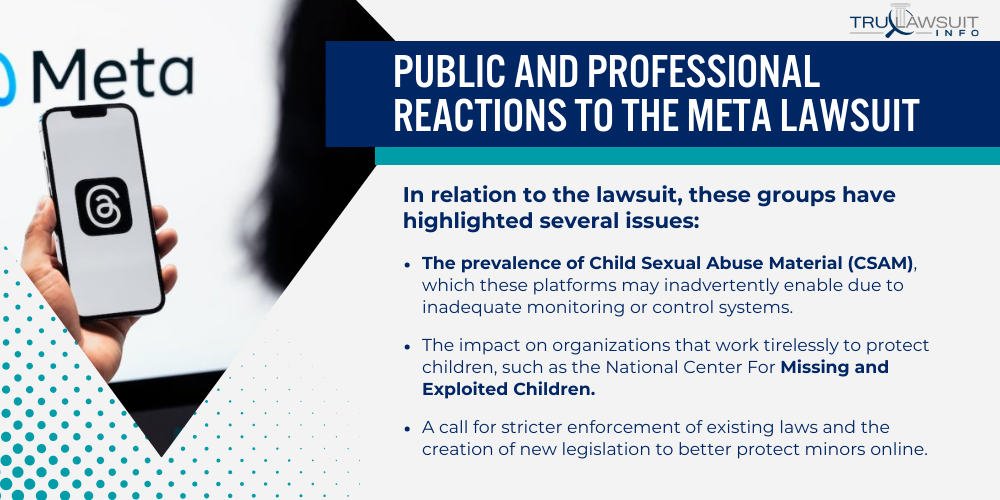
Response from Child Advocacy Groups
Child advocacy groups have been at the forefront of concerns rattling the foundation of online communication platforms by Meta.
In relation to the lawsuit, these groups have highlighted several issues:
- The prevalence of Child Sexual Abuse Material (CSAM), which these platforms may inadvertently enable due to inadequate monitoring or control systems.
- The impact on organizations that work tirelessly to protect children, such as the National Center For Missing and Exploited Children.
- A call for stricter enforcement of existing laws and the creation of new legislation to better protect minors online.
- Expressing concern for the mental well-being of children suggests that Meta’s platforms contribute to addictive behaviors.
Industry Analysis and Critique
The case has also garnered attention from the financial and tech sectors, with publications like The Wall Street Journal diving into the complexities of the lawsuit.
Industry experts and analysts have offered various critiques:
- Meta’s algorithms and design choices might contribute significantly to addictive behavior in young users.
- The scrutiny of Meta’s practices by state Attorneys General reflects a growing concern over tech companies’ responsibilities to their users.
- The critique is that Meta’s platforms could potentially impact the mental health of children, leading to broader societal concerns.
- Debates about whether Meta’s public statements regarding safety measures are sufficient or merely a facade.
Meta Platform Management and User Interaction
Meta Platforms integrates advanced technological features to manage its platform’s interactions, particularly around user safety.
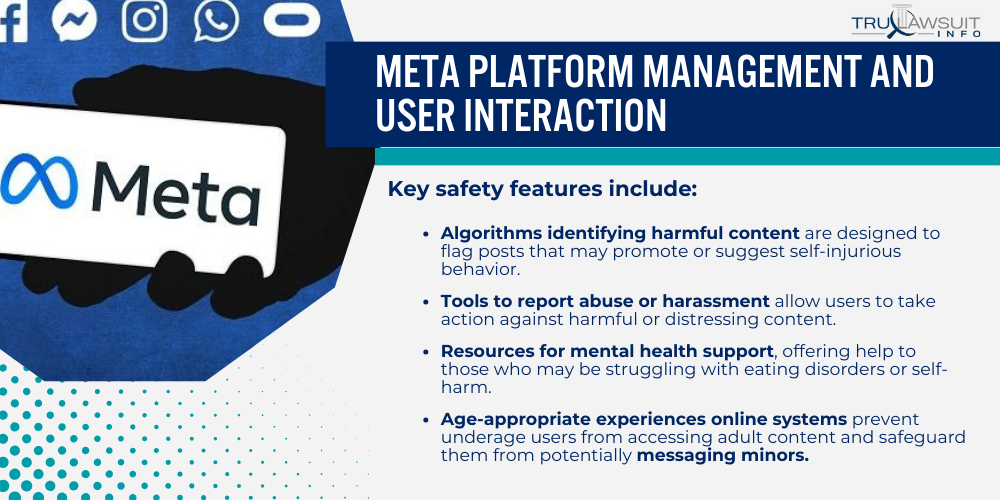
It also grapples with its influence on young users’ mental health and the social ramifications of its widespread use.
Technological Implementation for Safety
Meta Platforms has developed various security measures to protect users from harm.
They uphold a commitment to combat issues such as self-harm, eating disorders, and dangerous solicitations.
Meta employees play a crucial role in implementing these safety protocols.
Key safety features include:
- Algorithms identifying harmful content are designed to flag posts that may promote or suggest self-injurious behavior.
- Tools to report abuse or harassment allow users to take action against harmful or distressing content.
- Resources for mental health support, offering help to those who may be struggling with eating disorders or self-harm.
- Age-appropriate experiences online systems prevent underage users from accessing adult content and safeguard them from potentially messaging minors.
Social Media Dynamics and Young Demographics
The platform’s dynamics are pivotal in shaping the online experience for younger demographics.
These social media dynamics affect the mental health of younger users and raise concerns over Meta Platforms’ social responsibility.
Challenges include:
- Young users’ susceptibility to online pressure and the development of eating disorders.
- The risk of dangerous solicitations through messaging features.
- Meta employees’ responsibility to moderate content that could potentially harm younger demographics.
- Ensuring a balance between user engagement and the potential negative impact on mental health.
Meta Platforms and Their Social Impact
Meta Platforms exert significant social influence, and their management of user interactions has immense implications.
The social impact encompasses:
- The platform’s approach to dealing with content related to self-harm and promoting positive mental health.
- Steps taken by Meta Platforms to prevent dangerous solicitations, particularly those targeting minors.
- The potential of social media to amplify issues around eating disorders amongst impressionable demographics.
The role of Meta Platforms in society extends to bridging connections and communities; however, this must be managed with a conscious effort to prevent harm and promote well-being among its users.
The Broader Context of Social Media Regulation
When examining the regulatory landscape surrounding social media platforms, it is crucial to understand the dynamic interplay between governmental oversight, corporate ethics, and the imperative to protect children.
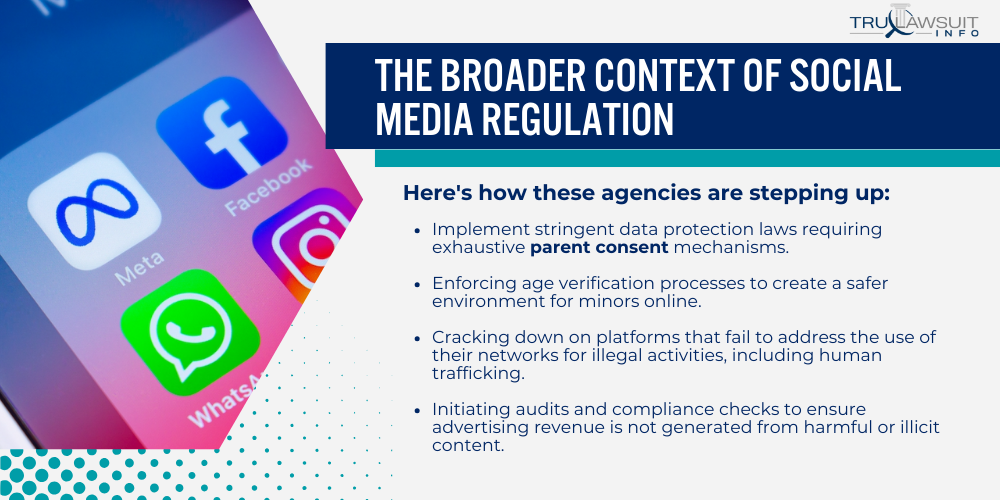
Governmental Oversight and Compliance
Governmental agencies worldwide are grappling with the complexities of social media regulation, aiming to curtail nefarious activities such as human trafficking while safeguarding user data.
Here’s how these agencies are stepping up:
- Implement stringent data protection laws requiring exhaustive parent consent mechanisms.
- Enforcing age verification processes to create a safer environment for minors online.
- Cracking down on platforms that fail to address the use of their networks for illegal activities, including human trafficking.
- Initiating audits and compliance checks to ensure advertising revenue is not generated from harmful or illicit content.
Each measure underscores the government’s role in policing the digital ecosystem, balancing the freedom of expression with the need to shield users from exploitation.
Corporate Responsibility and Social Ethics
On the flip side, social media companies are under increased pressure to demonstrate corporate responsibility and uphold social ethics.
Below are the critical steps being taken:
- Establishing clear and accessible user policies that detail permissible behaviors and content.
- Creating robust content moderation teams that work to eliminate exploitative content, including material related to human trafficking.
- Launching transparency reports to display efforts in combating misinformation and abuse.
- Collaborating with law enforcement to address criminal activity such as human trafficking.
By actively enhancing safety measures and ethical standards, social media corporations aim to foster trust and reaffirm their commitment to user welfare.
Future Implications Of The Meta Lawsuit
The outcome of the Meta lawsuit is likely to set a precedent affecting Meta Platforms Inc. and the broader tech industry, particularly with respect to data privacy and competition laws.
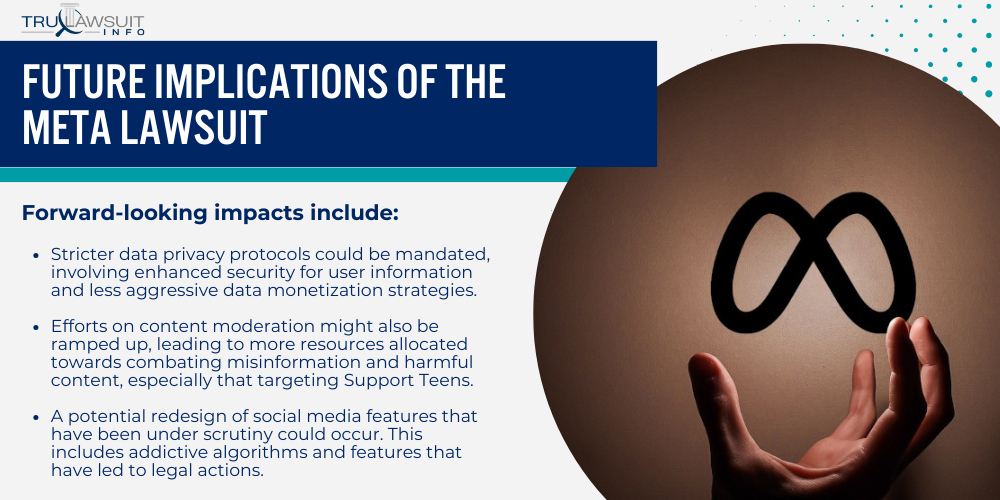
Long-Term Impact on Company Policies
Meta Platforms Inc., notably known for Facebook and Instagram, may see long-term changes in its internal policies and governance.
Forward-looking impacts include:
- Stricter data privacy protocols could be mandated, involving enhanced security for user information and less aggressive data monetization strategies.
- Efforts on content moderation might also be ramped up, leading to more resources allocated towards combating misinformation and harmful content, especially that targeting Support Teens.
- A potential redesign of social media features that have been under scrutiny could occur. This includes addictive algorithms and features that have led to legal actions.
- Changes in corporate governance might emerge, possibly affecting decision-making processes within the company, including vetoes by high-level executives like the Apple Executive.
Legislative and Societal Outcomes
The lawsuit against Meta impacts legislation and society.
It advocates for stronger regulation of social networks, especially towards minors.
It may lead to new support frameworks for tech users and prompt a closer examination of legal paradigms in state courts.
The lawsuit also drives increased demand for transparency in how companies collect and use personal data.
The lawsuit is poised to influence not only Meta’s policies but also legislative and societal landscapes:
- Attorneys General and other legal bodies may push for stronger regulations governing social networks’ responsibilities toward users, particularly minors.
- Consumer advocacy groups are likely to gain momentum, which could lead to the development of new support frameworks for technology users.
- State Courts might see a surge in related cases, prompting a closer examination of legal paradigms concerning social media platforms.
- Public awareness could lead to an increased demand for transparency in how companies like Meta operate regarding the collection and use of personal data.
Frequently Asked Questions
-
The latest development in the Meta litigation reveals that a settlement of $725 million has been proposed for privacy issues.
Meta and CEO Mark Zuckerberg have faced criticism for not banning certain social media features considered addictive to children.
-
Meta faces allegations centered around creating social media functionalities that lead to addiction in children.
Moreover, Mark Zuckerberg is accused of dismissing employee consensus on banning potentially harmful photo filters.
-
Following court approvals, payouts from the Meta lawsuit settlement are anticipated.
As the case progresses, affected parties will be updated about the precise distribution dates for the settlement funds.
-
The lawsuit against Meta has been brought forth in several states.
Notably, 33 attorneys general have taken action, and several other states have joined the legal battle, emphasizing the widespread attention the case has garnered.
-
Instagram, owned by Meta, is implicated in the controversy due to lawsuit claims that the platform has contributed to youth mental health issues.
The platform’s features and algorithms are being scrutinized for their potential negative impact on younger users.
-
The lawsuit underscores the grave concerns about mental health, particularly the effect of Meta‘s platforms on children and teenagers.
The legal action suggests that the company may have had a role in exacerbating mental health challenges among young users.

Attorney Jessie Paluch, founder of TruLawsuit Info, has over 25 years of experience as a personal injury and mass tort attorney, and previously worked as an international tax attorney at Deloitte. Jessie collaborates with attorneys nationwide — enabling her to share reliable, up-to-date legal information with our readers.
Legally Reviewed
This article has been written and reviewed for legal accuracy and clarity by the team of writers and legal experts at TruLawsuit Info and is as accurate as possible. This content should not be taken as legal advice from an attorney. If you would like to learn more about our owner and experienced injury lawyer, Jessie Paluch, you can do so here.
Fact-Checked
TruLawsuit Info does everything possible to make sure the information in this article is up to date and accurate. If you need specific legal advice about your case, contact our team by using the chat on the bottom of this page. This article should not be taken as advice from an attorney.
You can learn more about the Social Media Harm Lawsuit by visiting any of our pages listed below:
Here, at Tru Lawsuit Info, we’re committed to helping victims get the justice they deserve.
To do this, we actively work to connect them with attorneys who are experts in litigating cases similar to theirs.
Table of Contents
Tru Lawsuit Info is a reliable source of information about issues that may affect your health and safety, such as faulty products, data breaches, and environmental hazards.
Our team of experienced writers collaborates with medical professionals, lawyers, and advocates to produce informative articles, guides, and other resources that raise awareness of these topics.
Our thorough research provides consumers with access to reliable information and updates on lawsuits happening around the country. We also can connect consumers with attorneys if they need assistance.
Here, at Tru Lawsuit Info, we’re committed to helping victims get the justice they deserve.
To do this, we actively work to connect them with attorneys who are experts in litigating cases similar to theirs.
